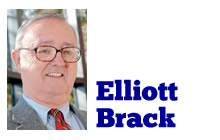By Elliott Brack, editor and publisher | Every now and then a big-time civil settlement makes sense and is good for our country.
 Recently the government brought suit against Education Management Corporation, based in Pittsburgh, Pa., which operated several for-profit colleges. The government maintained that the company was violating rules on paying incentives to employees for signing up unqualified students for Pell grant assistance to attend their schools. One story said all the low-income students needed was “a pulse and a Pell (grant)” for the colleges to enroll them. The Corporation enrolled students in 32 states and in Canada. Of course, that money went directly to the schools, not to the individual student.
Recently the government brought suit against Education Management Corporation, based in Pittsburgh, Pa., which operated several for-profit colleges. The government maintained that the company was violating rules on paying incentives to employees for signing up unqualified students for Pell grant assistance to attend their schools. One story said all the low-income students needed was “a pulse and a Pell (grant)” for the colleges to enroll them. The Corporation enrolled students in 32 states and in Canada. Of course, that money went directly to the schools, not to the individual student.
The Government won, as the Corporation agreed to a settlement for $95 million, plus agreed to forgive $102 million in loans to the students. However, the Corporation admitted no wrong-doing. That prevented the Corporation from being charged with other litigation. Reports say that had the case gone to trial, a verdict against the company could have amounted to billions.
The firm operated under several college names, including the Argosy University, the Art Institute, Brown Mackie College and South University, all doing business in Georgia.
Now here’s another element in this story: Among the owners of Education Management Corporation is, would you believe, none other than Goldman, Sachs, the Wall Street investment bank? Since the investigation by the government, the stock price per share of Education Management Corporation has fallen, from a high of about $22 to eight cents.
Serves the stockholders right, you might say, since they used illegal tactics.
Among ways the company violated the law was paying recruiters with bonus incentives based on the number of students they enrolled. Such practices violate federal student financial aid programs designed to prevent the enrollment of unqualified students. The company provided recruiters with paid vacations to resorts, gift cards, Godiva chocolates, baseball tickets to Pittsburgh Pirates’ games, free lunches and time off. All these incentives violated federal bans for student loan recruiters.
What is particularly good about this government action is that not only were the colleges getting federal money wrongfully and that they have been caught, but it sounds a warning to other for-profit colleges about such practices. Already under investigation are activities at other non-profit college, including now-closed Corinthian College, which enrolled 100,000 students, and Phoenix University, the biggest non-profit in the nation. Corinthian College’s campuses were mostly sold off last year under an agreement with the government. The Department of Education fined Corinthian $30 million, and the school is now in bankruptcy.
Another outcome of the government in the Educational Management Corporation case is that the school is forgiving some of the loans of the students. After all, goes the thinking in this corner, if this corporation was wrong in signing the students to an agreement, any loan against these students is wrong, too, and they should be forgiven the ill-gotten loans, which the corporation benefitted from.
Educators at non-profit and upstanding colleges across the country have long been upset with these for-profit colleges offering questionable opportunity and degrees, often online. Now the government, even if ever so slow, finally is putting the heat on these questionable educational institutions. Hopefully, our nation can be relieved from such bogus educational institutions.
Hurrah! for all this coming to light. Perhaps it’ll help curb these abuses. It’s well overdue.









Follow Us